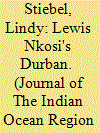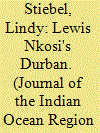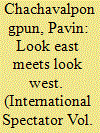|
|
|
Sort Order |
|
|
|
Items / Page
|
|
|
|
|
|
|
| Srl | Item |
| 1 |
ID:
125895


|
|
|
|
|
| Publication |
2013.
|
| Summary/Abstract |
Lewis Nkosi, the late exiled South African writer, and the city of Durban, an extended urban space of an estimated 3 million inhabitants, are incontrovertibly linked. This sprawling Indian Ocean town is where Nkosi was born, where he was educated as a small child, where he started his working career, and where he was finally buried on 10 September 2010. Given the centrality of Durban to Nkosi's life story, it is unsurprising that this city periodically appears in Nkosi's writing, both fictional and non-fictional, as a geographical 'setting' but also as a symbol of political change in South Africa. This paper, then, begins an evaluation of the role of 'Durban' and the Indian Ocean in the life and work of Nkosi, drawing from his novel Mating birds, and also from a little known article published in a Swiss newspaper, translated into German. Durban emerges from these various sources as a city in flux, a place of startling contrasts, a melting pot of peoples and a dream space called 'home' for this celebrated writer.
|
|
|
|
|
|
|
|
|
|
|
|
|
|
|
|
| 2 |
ID:
130645


|
|
|
|
|
| Publication |
2013.
|
| Summary/Abstract |
Lewis Nkosi, the late exiled South African writer, and the city of Durban, an extended urban space of an estimated 3 million inhabitants, are incontrovertibly linked. This sprawling Indian Ocean town is where Nkosi was born, where he was educated as a small child, where he started his working career, and where he was finally buried on 10 September 2010. Given the centrality of Durban to Nkosi's life story, it is unsurprising that this city periodically appears in Nkosi's writing, both fictional and non-fictional, as a geographical 'setting' but also as a symbol of political change in South Africa. This paper, then, begins an evaluation of the role of 'Durban' and the Indian Ocean in the life and work of Nkosi, drawing from his novel Mating birds, and also from a little known article published in a Swiss newspaper, translated into German. Durban emerges from these various sources as a city in flux, a place of startling contrasts, a melting pot of peoples and a dream space called 'home' for this celebrated writer.
|
|
|
|
|
|
|
|
|
|
|
|
|
|
|
|
| 3 |
ID:
105696


|
|
|
|
|
| Publication |
2011.
|
| Summary/Abstract |
India has been eager to expand its economic networks with Southeast Asia, one of the most vibrant segments of the world economy, accounting for a large share of global exports. In addition to the economic links required to feed India's fast growing economy, greater cooperation and integration is considered a way of promoting development in India's northeast as well as the less-developed Southeast Asian countries. While some fear growing rivalry in the area between India and China, their growing commercial interests are more likely to lead to enhanced cooperation, given the need to build up a peaceful environment to protect their business interests in the region. The competition could also prove beneficial to Southeast Asia itself, spurring economic openness and competition.
|
|
|
|
|
|
|
|
|
|
|
|
|
|
|
|
|
|
|
|
|